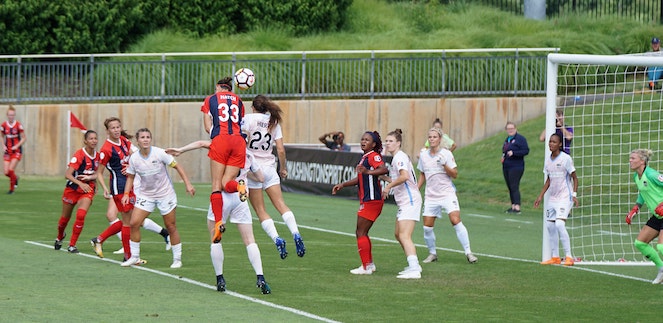Challenges That Come With Playing College Sports
Playing sports in college is very rewarding and fun, especially if your son or daughter finds the right situation, but it comes with some challenges as well. Several student-athletes were asked what their main challenges were when playing sports in college. The following is a list of some of those challenges and ways to help your child overcome them.
Challenges for Student-Athletes:
- Being understood by the coaches
- Getting enough downtime
- Getting enough playing time and recognition
- Understanding their role on the team
- Coping with the pressure to succeed
Being Understood by the Coaches
Many student-athletes feel like coaches do not understand them. This is not uncommon. However, in many cases, it’s not true. Coaches are people, too. Often, coaches are seen as being on a different level and, therefore, athletes do not establish healthy relationships with them. Coaches can be advocates, but it takes work to build relationships that allow for open communication and transparency between coaches and players. Encouraging your child to openly communicate with college coaches about desires, goals and challenges, both inside and outside of sports, is a way to begin building a trusting relationship. Use the expertise of the coaches for more than just sports. How can they help your child grow, develop and become networked for after graduation?
Many coaches do not really get to know their student-athletes until they are one or two years into college. By then, one or both parties could be unhappy. Working to build good relationships takes work for both the coaches and your child.
You may get phone calls from your son or daughter complaining about the coach. This may even happen in high school. Listening to and supporting your child through these conflicts is good, but sending him or her back to the coach is also good. Chances are the coach will be open to the athlete coming to talk about things. Coaches are not happy when players are unhappy.
Try not to do the talking for your child, both during the recruiting process and when he or she gets to college. Coaches want to hear from the players. Coaches want to get to know the players. Their jobs depend on your child finding the right fit.
At the same time, understand that it is not easy being the coach. Managing many different, young personalities and trying to keep everyone on the same page, both in and away from sports, takes a lot of energy and time. Coaches work many hours after practice and games dealing with the day-to-day activities of running a team. Appreciate the coaches and try to get to know them better and help your child do the same. Work on the relationship. It will make all the difference.

Getting Enough Downtime/Time Away From Sport
Time away from sport is critical for a long, healthy career in sports. High school and college sports are very demanding. Lots of time, energy and money are spent on sports. Everyone expects more time from the athletes. Many high school athletes play sports in high school and then play club sports in the offseason. When college begins, athletes train all year long. Finding time away from sports gives the body valuable rest time while allowing the mind to take a break. Pushing the body and mind every day causes fatigue. The best way to refuel is rest and nutrition.
When your child gets to college, academics and athletics will feel like two full-time jobs. It will be ten times more demanding than it was in high school. At times, the student-athlete will feel overwhelmed with sports, and, meanwhile, schoolwork will be piling up on them.
This is when they need a listening ear and an encouraging voice to keep them motivated to continue, especially in that first year. It’s okay to encourage them to get rest and to take breaks when they need them. This is the challenge that will help them grow and develop. When they can take breaks, they need to take real breaks. Train hard when it is time to train. Rest when it’s time to rest.
They may need help building the rest time in. They may have to learn how to schedule it into their day, and they may need to ask for help from their coaches or academic advisors.
As they mature in college, they will figure out how to manage all of it.
Getting a great start with every year, and with the very beginning of college, will help, especially with their academics.

Getting Enough Playing Time and Recognition
Everyone wants to play, and everyone wants to contribute. No matter what sport we are talking about, playing time and getting recognition are issues that student-athletes face. Will they get the playing time they desire? Will they receive any recognition for the work they have put in? It is important to recognize that so much is outside of the athletes’ control. What they do have control over, however, is how hard they work and what they are willing to put into their sport. Playing time and recognition may or may not come when desired, but going after something whole-heartedly usually brings the desired outcome. Playing a sport is competitive and challenging, but that is the only way to grow.
When your child calls home about not getting a fair shake at a starting position, or that coach is not treating them fairly, or that coach is favoring one player over another, or that your child does not understand why she is not playing, you’ll want to reach for the phone and call that coach. HOLD THAT THOUGHT!
Instead of calling the coach right away, encourage your child to continue to work and practice hard and be patient. Encourage communication with your child. Suggest that he or she go to the coaches and ask for more guidance and clarification about playing time. Have your child ask for clarification about expectations. Continue to communicate.
I once coached an All-American high school player that did not see playing time until late in her sophomore year. She worked every day and was committed to improving. Others told her to quit or transfer, but she didn’t. She stayed with it. Her junior year, she blossomed and her last two years of college were fantastic. She made all-conference, received conference honors and ended up playing professionally. It was not easy. There were many tears, but, when she looks back now, she sees how those challenges helped her more than the easy times.
If your child knew ahead of time that he or she was going to be a huge success in life because of what was learned while playing sports, your child would do it regardless of playing time or recognition. There are many athletes that are now successful executives, lawyers, doctors, teachers, coaches, and service men and women that sat on the bench or had to wait to play. Many of those athletes claim that being an athlete is the reason they are where they are today. What is learned as an athlete—the teamwork, dedication, commitment, strong work ethic and sacrifice—is what drives success later in life.
With that said, it is no fun for anyone to sit on the bench. It’s hard. It takes a lot of courage to stay in the race, but each and every individual can control how he or she approaches playing time issues and can form a plan to get better. There has to be a huge commitment to improving, outworking people and putting in the extra time.
The same is true for academics. Extra time and energy, on top of sports, may have to go into academics. More tutors, study time, appointments with professors, etc. are all realistic necessities of the student-athlete. With time, your child will learn how to fit it all in. Until then, they will need a lot of encouragement and support.
Regardless of what happens in college, both academically and athletically, help your child see the bigger picture. Great growth and development are happening. Support and inspire your child to be a great classmate and a great teammate. The rest will take care of itself.
If he or she works as hard as possible, the recognition and the rewards will follow. It may not happen exactly as planned, but it will happen. Help your child to allow academics, sports and college to propel him or her into the success story meant to be.

Understanding Their Role on the Team
Understanding team roles can also be a challenge. Each role on a team is unique and must be filled with the team’s success in mind. The coaches have to organize a team and put people in roles that they believe will benefit the team. Every role must be filled if winning is going to take place. The role assigned to your child may or may not be what you had anticipated. It is hard to play a role that one does not necessarily wish to play. However, when roles are embraced, many times it turns out better than expected.
If your child is assigned a role he or she loves, then encourage him or her to work hard to keep it. It could change tomorrow. If the role assigned is not the anticipated or desired role, then encourage your child to embrace the role, but also ask questions and communicate with the coaches. There is nothing wrong with asking questions. All players should want clear expectations. Maybe the role was assigned because your child is the absolute best at it. Maybe this role is grooming him or her for another role later, one that might be even more desirable. Maybe it’s the critical role on the team that is missing and the coach picked your child because he or she can handle it. Without communication, assumptions will consume thoughts.
Many athletes today just leave or quit when the role is not what they wanted; they don’t give the role a chance. They leave before they know what happens. Chances are staying put may be better than expected.
Coping With the Pressure to Succeed
Playing sports comes with the pressure to win the game, make the team, get a scholarship, make the first team, set the record, break the record, hold the record, become the best one can be, play in college, become a starter, etc. There are countless pressures that follow the athlete. Dealing with pressure is part of the challenge.
There are many ways to cope with pressure. One way is to just be present in the moment. It sounds cliché, but it’s true. Embracing the moment is a key to success. Most people worry about the past and the future, and therefore miss the present. Helping your child live in the present and be grateful for each gift he or she possesses can help diffuse the pressure associated with being an athlete.
The same is true with wanting to do well academically. There are competition and pressure with each paper, assignment, research project and exam. Things add up. Encouraging your child to do the very best is all that can be expected. Your child may need to be reminded, especially when finals are coming up and there is a major game or meet on the same day, to just focus on what is right in front and try to conquer the moment.
Another way to cope with pressure is to learn how to calm the mind in stressful moments. Taking deep breaths helps calm the breathing, and the rest of the body follows. Some athletes enjoy meditation. Many athletes have never tried mediation until they get to college, but, like everything else, it takes practice. If you have a chance to introduce meditation to your child in high school, I would advise it.
Other athletes face the pressure of having to get a scholarship and playing at the highest level. Finding the right fit will be vastly more useful to your child than just finding money or the highest level. If a student-athlete wants to play, there is a place for him or her, one that really fits. Don’t be afraid to look at all of your child’s options at all levels. You never know what you will discover until you do your research. There are ways to find money for college.

Above All
Being a college athlete is fun, exciting, challenging and rewarding. Your child is going to learn so much about life, and he or she will grow exponentially as a person. Let the sport, coaches, teammates and circumstances bring that challenge. Embrace it with your child and celebrate all the little victories that will make you so proud in the end. And, most importantly, have fun with it.
For more information about teams: Beyond the Talent: Profile of a Winning Team



